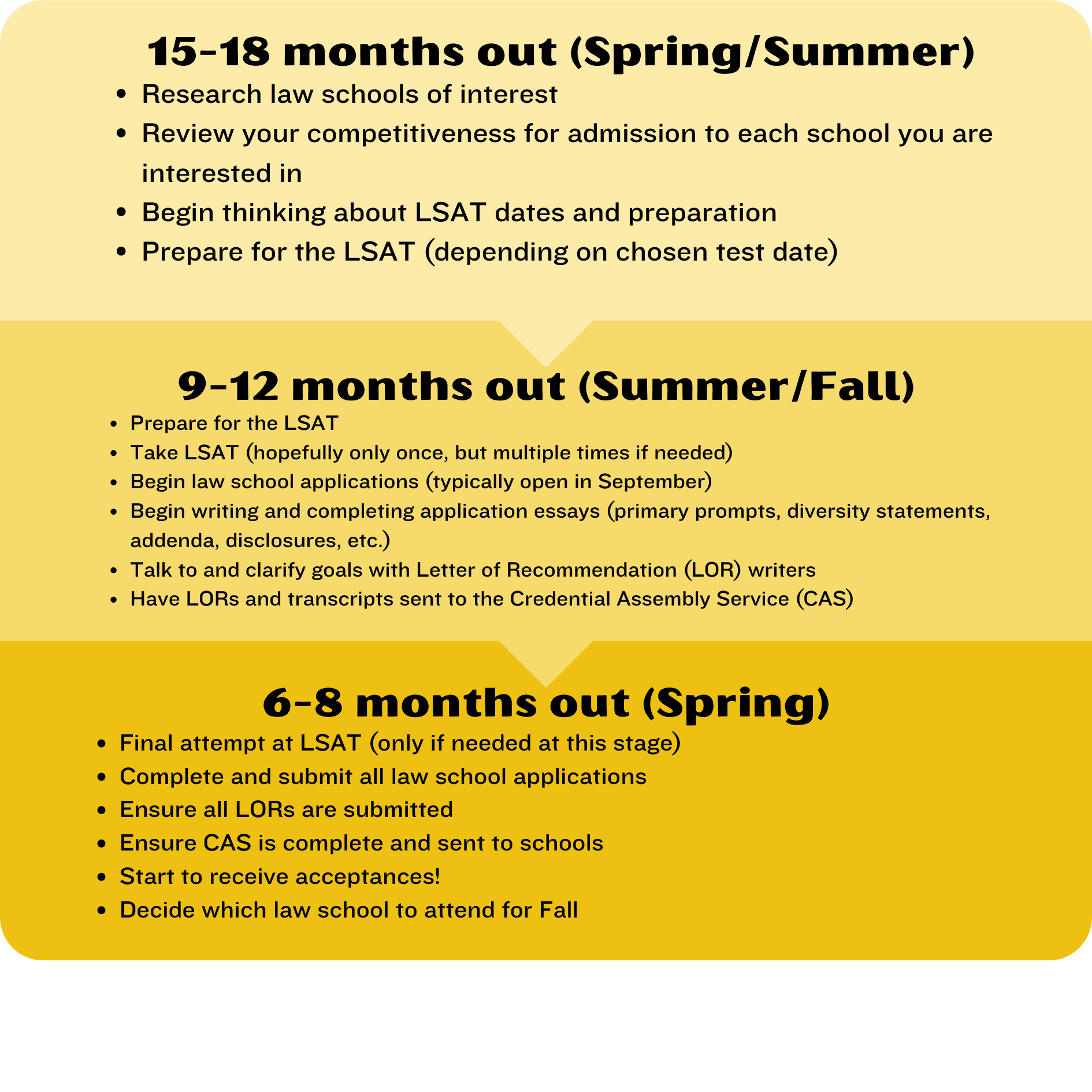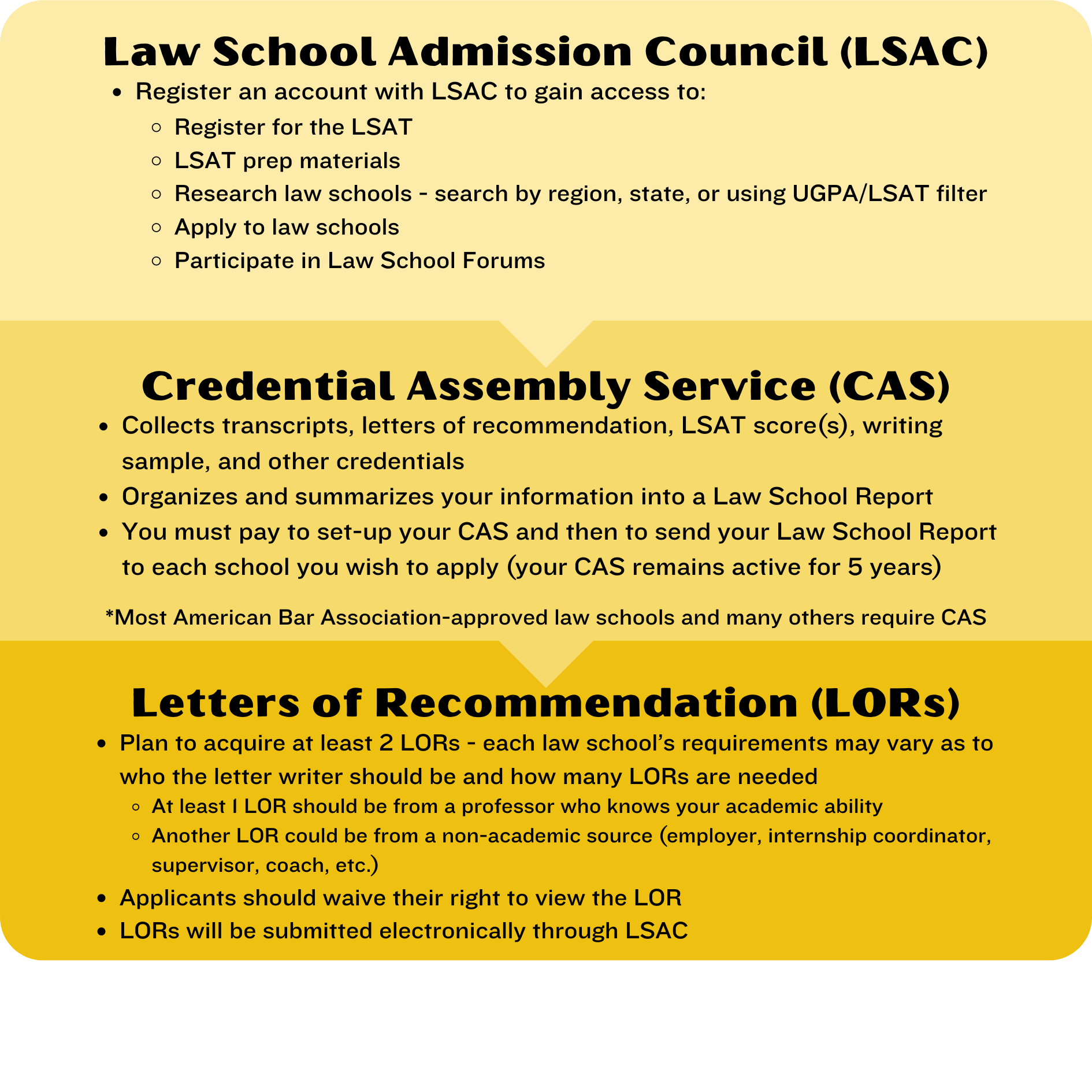Successfully applying to law school requires planning. The Law School Admission Council (LSAC) along with UCF’s Pre-Health and Pre-Law office are resources to guide you as you prepare, apply, and choose where you want to go to law school.
Email us at aap@ucf.edu to be added to our Law School Webcourses! Please include your UCF ID.
APPLICATION TIMELINE
It is recommended to begin the law school application process about 15-18 months prior to your planned law school enrollment. For example, if a student wanted to being law school in Fall 2026, he/she should ideally begin preparing for application in late Spring or Summer of 2025.

APPLICATION KEY COMPONENTS
There are many aspects of the application to consider during your preparations for law school. It is suggested to take some time familiarizing yourself with the following resources:
Law School Admission Council (LSAC) Website
Credential Assembly Service (CAS)
Letters of Recommendation Resources:
–Center for Pre-Law Advising (U of Wisconsin-Madison)
–Student Guide to Law School (GA Tech)
–Letters of Recommendation (LSAC)

RESOURCES FOR RESEARCHING & CHOOSING LAW SCHOOLS
- ABA’s Standard 509 Reports – This is the official “Entrance Statistics” for students enrolling in each law schools. These reports provide the most current and comprehensive data from the American Bar Association (ABA) including LSAT score and GPA ranges for each law school in addition to other admissions data; tuition and fees, living costs, and financial aid; conditional scholarships; enrollment data, including academic, transfer, and other attrition; numbers of full‐time and part‐time faculty, professional librarians, and administrators; class sizes for first‐year and upper‐class courses; number of seminar, clinical and co‐curricular offerings; employment outcomes; and bar passage data.
- ABA’s Employment Summary Reports – This is the official “Exit Statistics” for students seeking employment after graduating from each law school. These reports provide the most current and comprehensive employment summary data from the American Bar Association (ABA) and include data on graduates from each law school’s employment status, employment type, and employment location.
- LSAC’s Official Guide to ABA-Approved Law Schools – Utilize this guide to search by Undergraduate GPA, LSAT, state, region, keyword, etc. It also includes links to all law schools’ websites.
- LSAC’s Handouts – LSAC has materials created to support students on their enrollment and learning journeys from prelaw through practice. An account is needed to view these materials.
- Evaluating and Choosing Law Schools – Read about the factors to consider when deciding on schools to apply to and/or attend.
APPLICATION ESSAY KEY COMPONENTS
Personal Statements
- Each law school will have a different personal statement essay prompt – be prepared to write different essays for the different law schools you apply to!
- Examples of personal statement essay prompts from actual law schools:
- “In making admissions decisions among applicants with comparable LSAT scores and GPAs, the Committee considers a number of other factors. These include: interesting or demanding work or service experience; leadership potential; rigorousness of undergraduate course of study; graduate study; economic need requiring significant employment during college; social or cultural disadvantages; and extraordinary family or personal responsibilities. Your personal statement should discuss any of these factors that you would like the Committee to consider.”
- “We seek to enroll a class with varied backgrounds and academic skills. Such diversity contributes to the learning environment of the law school, and historically has produced graduates who are leaders in every area of law and who serve all segments of society. To better assess such qualities, we require each applicant to submit a Personal Statement.”
- “The Admissions Committee requires a personal statement. In no more than three typed, double-spaced pages, please discuss your reasons for pursuing a legal education and your goals or future plans upon graduation. You may discuss any obstacles that you have overcome (for example, English is not your native language, discrimination, economic or family hardship, severe medical condition, etc.).”
- “You may write your personal statement on any subject of importance that you feel will assist us in our decision.”
Diversity Statements
- Some law schools will offer an opportunity for you to discuss what diverse perspective you can bring to their school. This perspective does not have to be focused solely on “typical” diversity topics (ex. race/ethnicity). You should think about experiences you have had when you have learned/gained cultural competency.
- Some examples of diversity statement essay prompts from actual law schools:
- “If you wish to supplement your application with a diversity statement, you may do so with an attachment to your application through LSAC.”
- “Candidates are encouraged to submit an optional statement describing the diverse skills that they have developed, including relevant specific life experiences, and how such skills and experiences would foster diversity at the College of Law. Please focus on your interests, unique abilities, and personal background (including, but not limited, to information about socioeconomic background, first generation status, gender, ethnicity and race and other attributes).”
- “The College of Law recruits students from diverse racial, economic, educational, and ethnic backgrounds. The Admissions Committee encourages you to attach a brief statement that will enable the Committee to understand the contribution your personal background would make to the student body of the College of Law.”
Addendum
- A statement to clarify any gaps or weaknesses in your application. An addendum could include an explanation of:
- Low grades
- Low or differing LSAT scores (ex. 5+ point jump)
- Multiple withdrawals
- Leave or break in academic/work history
- Any other academic red flags
- Some examples of addendum essay prompts from actual law schools:
- “You may include an academic addendum, explaining any circumstances that you believe may have negatively affected your undergraduate GPA or performance on the LSAT.”
- “Please attach any addendums you would like included in the review of your application here.”
- “You may use this attachment slot to provide any additional information necessary for a full representation of your candidacy.”
Disclosures
- Disclose, disclose, disclose!
- Disclose on your law school application if you ever had any of the following:
- Academic Misconduct
- Academic Disciplinary Actions
- Criminal Record – even if it is expunged
- Possible consequences of failing to disclose:
- Rescind your offer of admission – even after you begin school
- Other law schools could be notified of your failure to disclose
- Potential to fail the Character & Fitness portion of the Bar
- Some examples of disciplinary essay prompts from actual law schools:
- “If you answer yes to any of the Disciplinary Information questions, submit with your application a full statement of the relevant facts for all incidents. You may be required to furnish the College of Law with copies of all official documents explaining the final disposition of the proceedings.”
- “If you answered YES to any of the character and fitness questions, you must submit a detailed explanation including date(s), circumstances surrounding the incident, and the final outcome. In some cases, court documentation may be required. It is your responsibility to ensure all information is accurate and complete before submitting your application.”
- “Have you ever been accused of violating the honor code, student conduct code, or other disciplinary code; warned, placed on probation for academic, residential or disciplinary reasons; suspended, requested or advised to discontinue studies; dropped, expelled, or requested to withdraw; or otherwise been subjected to discipline for academic or conduct reasons by any post-secondary school, college, university, professional school, or law school? If yes, please attach a statement with dates and details.”
- “Have you ever been arrested, detained, or restrained; taken into custody; or accused formally or informally of a violation of law or ordinance? You should disclose each instance even though the charges may have been dismissed, or you were acquitted, or adjudication was withheld, or a conviction was reversed, set aside, or vacated. If you have any charges pending or active warrants for your arrest, you are required to answer yes. This question includes periods before you turned 18. If your records were expunged pursuant to applicable law, you may not be required to answer yes, but you should carefully read the Character and Fitness Disclosure. A Dismissal is not an expungement. You must include any traffic violations (even those you believe to be minor) if the violation resulted in a jail sentence, suspension, or revocation of driver’s license, or a fine of more than $200.00. Any arrest, including a written arrest, charge or conviction of driving while intoxicated or under the influence of drugs or alcohol must be disclosed, regardless of sanctions or outcome. If you are unsure whether to answer “yes,” we strongly recommend answering “yes” and fully disclosing all incidents. In addition to a bar examination, there are character, fitness, and other qualifications for admission to the bar in every U.S. jurisdiction. Applicants are encouraged to determine the requirements for any jurisdiction in which they intend to seek admission by contacting the jurisdiction. Addresses for all relevant agencies are available through the National Conference of Bar Examiners.
If you answer yes, you must attach or send us your full statement of relevant facts and attach a copy of the final court documentation (disposition, DMV record) or arrange for a copy to be emailed or mailed to the office.”